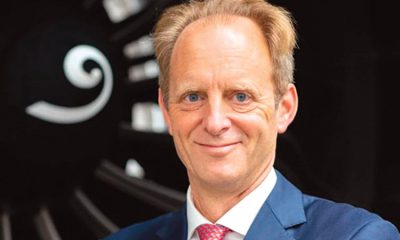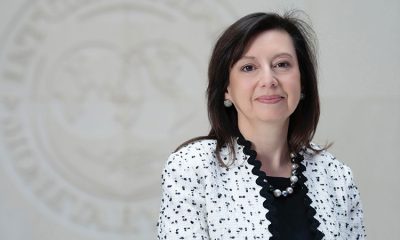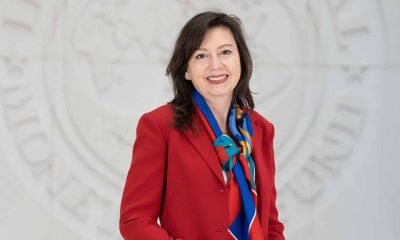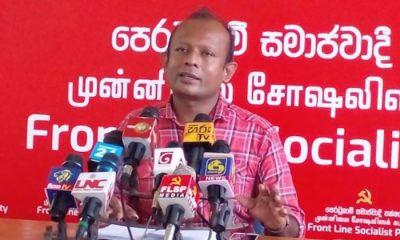News
Sri Lanka’s economic reform programme yielding first signs of recovery – IMF
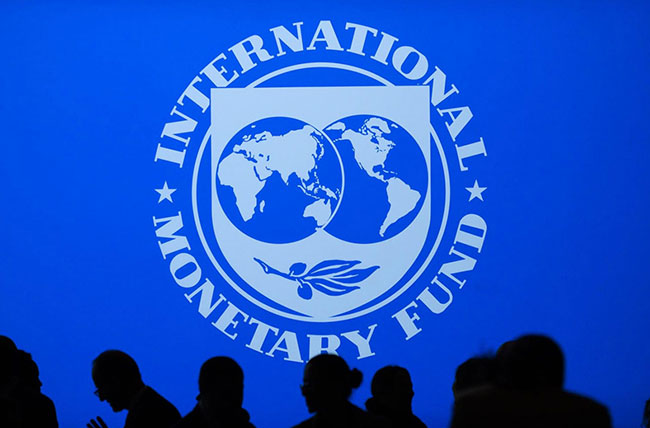
The economic reform programme, implemented by the Sri Lankan authorities is yielding the first signs of recovery with positive real GDP growth in the third quarter of 2023, low inflation, increased revenue collection, and a build-up of external reserves, the IMF has said.
Staying the course on the reform agenda is necessary for this stabilization to evolve into broad-based and stable growth that will ensure a full and lasting economic recovery benefitting the people, the IMF has said.
Progress in meeting key commitments, under the IMF-supported programme, will be formally assessed in the context of the second review of the Extended Fund Facility (EFF) arrangement, alongside the forthcoming 2024 Article IV consultation assessing Sri Lanka’s economic health.
An International Monetary Fund (IMF) mission team, led by Mr. Peter Breuer, visited Sri Lanka from January 11 to 19, 2024, to discuss recent macroeconomic developments and progress in implementing economic and financial policies under the EFF arrangement. At the end of the mission, Mr. Breuer issued the following statement:
“The economic reform programme, implemented by the Sri Lankan authorities, is yielding the first signs of recovery. Real GDP recorded positive growth of 1.6 percent year-on-year in the third quarter of 2023, the first expansion in six consecutive quarters. Shortages of essentials have eased, and inflation remains contained. Gross international reserves increased by USD 2.5 billion during 2023, and preliminary data point to improved fiscal revenue collections during the fourth quarter of 2023. However, challenges remain as these improvements need to translate into improved living conditions for Sri Lanka’s people.
“In this context, sustaining the reform momentum and ensuring timely implementation of all programmes commitments are critical to rebuilding confidence and putting the recovery on a firm footing that will benefit all people. Swift progress towards the introduction of a progressive property tax is key to ensuring fair burden sharing while sustaining the revenue-based consolidation. Tax policy measures need to be accompanied by strengthening tax administration, removing tax exemptions, and actively eliminating tax evasion to make the reforms more sustainable and to further build confidence among creditors to support Sri Lanka’s efforts to regain debt sustainability.
“Building on the Central Bank of Sri Lanka’s success in taming inflation, future monetary policy decisions should remain prudent with a focus on keeping inflation expectations well anchored. Against continued uncertainty, it remains important to continue rebuilding external buffers through strong reserve accumulation. Protecting the poor and the vulnerable through improved targeting and better coverage of cash transfers remains critical.
“To safeguard the stability of the financial sector and bolster its capacity to support economic growth, the authorities need to urgently finalize amendments to the Banking Act in line with their commitment under the IMF-supported program, implement the bank recapitalization plan and strengthen the financial supervision and crisis management framework.
“Following the publication of the IMF Governance Diagnostic report, it is now imperative for the authorities to adopt their own action plan for implementing the recommendations in the report beyond the priority commitments under the EFF arrangement. At the same time, ensuring an enabling environment for governance and transparency reforms to take place is key to bolstering public confidence and facilitating implementation of these important efforts.
“The authorities have made commendable progress with putting debt on a path towards sustainability. The execution of the domestic debt restructuring was an important milestone. A swift completion of final agreements with official creditors and reaching a resolution with external private creditors remain critical. Progress in meeting key commitments under the IMF-supported program will be formally assessed in the context of the second review of the EFF arrangement alongside the forthcoming 2024 Article IV consultation assessing Sri Lanka’s economic health.
“The IMF team held meetings with President and Finance Minister Ranil Wickremesinghe, Central Bank of Sri Lanka (CBSL) Governor Dr. P. Nandalal Weerasinghe, Speaker Mr. Mahinda Yapa Abeywardana, Minister Mr. Kanchana Wijesekera, Minister Mr. Wijeyadasa Rajapakse,State Minister Mr. Shehan Semasinghe, Secretary to the Treasury Mr. K M Mahinda Siriwardana, Governor of Northern Province Mrs. P.S.M.Charles, Governor of Eastern Province Senthil Thondaman, and other senior government and CBSL officials. The IMF team also met with Parliamentarians, representatives from the private sector, civil society organizations, and development partners.
“We would like to thank the authorities for the excellent collaboration during the mission, including during the mission’s visit to the Northern and Eastern provinces. This visit enriched the mission team’s understanding of the challenges as well as the potential of Sri Lanka. We reaffirm our commitment to support Sri Lanka for a full economic recovery from the crisis.”
News
Israel resumes attacks as Iran vows to avenge supreme leader’s death

* Iran begins 40-day mourning after Khamenei killed in US-Israeli attack
* President Pezeshkian condemns killing as ‘a great crime’
Iran has begun 40 days of mourning after Supreme Leader Ayatollah Ali Khamenei was killed in ongoing attacks by the United States and Israel, according to Iranian state media.
Top security officials were also killed in Saturday’s strikes, along with Khamenei’s daughter, son-in-law and grandson. The killings mark one of the most significant blows to Iran’s leadership since the 1979 Islamic revolution Al Jazeera has reported.
Iranian President Masoud Pezeshkian condemned the killing as “a great crime”, according to a statement from his office. He also declared seven days of public holidays in addition to the 40-day mourning period.
Reporting from Tehran, Al Jazeera’s Tohid Asadi said people were pouring into the streets of the capital following the news of Khamenei’s killing.
“There will be expected ceremonies,” he said, noting they would likely take place amid continuing bombardment across the country.
Protests denouncing Khamenei’s killing were also reported elsewhere, including Shiraz, Yasuj and Lorestan.
“There will be expected ceremonies,” he said, noting they would likely take place amid continuing bombardment across the country.
Footage aired by Iranian state media showed supporters mourning at the shrine of Imam Reza in Mashhad, with several people seen crying and collapsing in grief, according to Al Jazeera.
The killing also led to protests in neighbouring Iraq, which declared three days of public mourning. In Baghdad, protesters confronted security forces in the heavily fortified Green Zone, which houses Iraqi government buildings and foreign embassies.
Videos verified by Al Jazeera showed demonstrators waving flags and shouting slogans, with witnesses saying some were attempting to mobilise towards the US Embassy. Footage also showed protesters blocking vehicles at a roundabout near one of the entrances to the area.
There was also a protest in the Pakistani city of Karachi, where footage, verified by Al Jazeera, showed people setting fire to and smashing the windows of the US consulate.
However, there have also been reports of celebrations in Iran, with the Reuters news agency quoting witnesses as saying some people had taken to the streets in Tehran, the nearby city of Karaj and the central city of Isfahan.
Meanwhile, the official IRNA news agency reported that a three-person council, consisting of the country’s president, the chief of the judiciary, and one of the jurists of the Guardian Council, will temporarily assume all leadership duties in the country. The body will temporarily oversee the country until a new supreme leader is elected.
Ali Larijani, the head of Iran’s Supreme National Security Council, accused the US and Israel of trying to plunder Iran, in an interview aired on state TV.
He also called on Iranians to unite. “Groups seeking to divide Iran should know that we will not tolerate it,” he added.
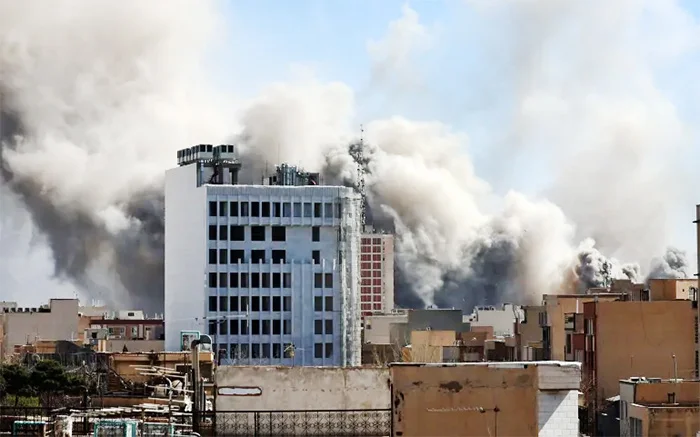
Smoke rises over central Tehran following ongoing U.S.–Israeli strikes on Iran yesterday.[EPA]
Khamenei assumed leadership of Iran in 1989 following the death of Ayatollah Ruhollah Khomeini, who had led the Islamic revolution a decade earlier.
While Khomeini was regarded as the ideological force behind the revolution that ended the Pahlavi monarchy, Khamenei went on to shape Iran’s military and paramilitary apparatus, strengthening both its domestic control and its regional influence.
Meanwhile, the Islamic Revolutionary Guard Corps (IRGC) pledged revenge and said it had launched strikes on 27 bases hosting US troops in the region, as well as Israeli military facilities in Tel Aviv.
Explosions have continued to be reported in Qatar and the United Arab Emirates, while security alerts are in place in several countries across the region.
US President Donald Trump, in a social media post on Sunday, warned Iran that it would be hit “with a force that has ?never been seen before” if it retaliated.
Iran’s retaliatory attacks since Saturday have targeted Israel and US assets across multiple Middle East countries, including Qatar, the UAE, Kuwait, Bahrain, Jordan, Saudi Arabia and Iraq.
Harlan Ullman, chairman of the strategic advisory firm Killowen Group and an adviser to the Atlantic Council in Washington, DC, said the US may have made a “big mistake” by killing Khamenei.
“Decapitation only works when you get all the leaders, and I don’t think that we got all the leaders,” Ullman said, adding that the US should not expect Iran’s leadership to enter negotiations in the immediate aftermath.
Iranian state media reported on Saturday at least 201 people have been killed in the joint US-Israeli attacks across 24 provinces, citing the Red Crescent. In southern Iran, at least 148 people were killed and 95 wounded in a strike on an elementary girls’ school in Minab on Saturday, with the toll continuing to rise, according to state media.
News
CPC has enough fuel stocks
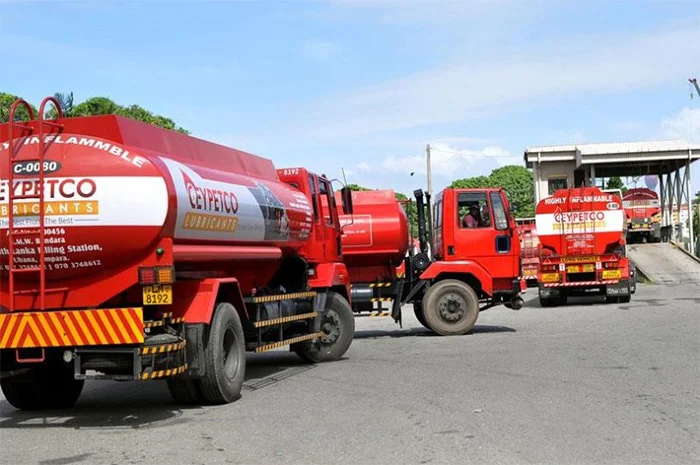
There would be no delay in fuel shipments scheduled for April and May, the Ceylon Petroleum Corporation (CPC) assured yesterday.
Addressing a media briefing in Colombo, CPC Chairman D.J. Rajakaruna said Sri Lanka’s fuel supplies did not originate from the present conflict zone in West Asia and, therefore, supplies to the Corporation would not be disrupted.
He noted that the relevant consignments were due to arrive from India and Singapore as planned.
“We are making this statement responsibly. There is no need for the public to queue up for fuel. Distribution was not originally scheduled for Sunday (01), but due to increased demand, we have deployed all distribution staff to continue fuel issuance. Although Monday (02) is a Poya Day, fuel supplies will continue without interruption,” he said.
The Chairman added that all filling stations had been instructed not to dispense fuel into cans or barrels, warning that legal action would be taken against those attempting to purchase fuel in bulk containers for resale.
News
Lanka, Pakistan strengthen ties at 13th JEC

The 13th Session of the Sri Lanka–Pakistan Joint Economic Commission (JEC) was successfully held recently in Colombo, reinforcing the strong and longstanding economic and diplomatic ties between the two countries.
The Sri Lankan delegation was led by Wasantha Samarasinghe, Minister of Trade, Commerce, Food Security and Cooperative Development, while the Pakistani delegation was headed by Haroon Akhtar Khan, Special Assistant to the Prime Minister of Pakistan for Industries and Production. The session concluded with the signing of the Agreed Minutes by both Co-Chairs, formalising cooperation across multiple sectors.
The Pakistan High Commission in Colombo said that in the IT and digital economy, both sides agreed in principle to establish a Joint Working Group on IT and telecommunications, promote collaboration in emerging technologies, and support each other in international digital forums.
Industrial cooperation was a key focus, with discussions on expanding trade in chemicals, polymers, engineering goods, glassware, surgical instruments, and pharmaceuticals. Sri Lanka invited Pakistani pharmaceutical companies to explore investment opportunities in designated pharmaceutical zones. Both countries also agreed to strengthen collaboration in Export Processing Zones and enhance support for small and medium enterprises through their respective development agencies.
Significant progress was made in agriculture and livestock, including cooperation on meat exports, livestock farming, seed certification, sanitary and phytosanitary harmonisation, pest risk analysis, and capacity building. Procedures for the export of Sri Lankan pineapples and avocados to Pakistan were advanced. Both sides explored electronic phytosanitary certification (ePhyto), blockchain-based seed traceability systems, and increased trade in agro-commodities such as rice, sesame, and onions.
In education, the JEC emphasised academic and research cooperation, faculty and student exchanges, accreditation and quality assurance, and promoting Pakistan as a higher education destination for Sri Lankan students. A Joint Working Group on Education and Science was proposed, alongside renewal of several institutional Memoranda of Understanding.
Cooperation in science, technology, and innovation will continue under existing bilateral frameworks, with plans for joint research in advanced materials, biotechnology, climate change mitigation, and emerging technologies. Collaborative research projects, student exchanges, and co-authored publications were highlighted as key initiatives.
Health sector collaboration will focus on joint research, academic exchanges, regulatory cooperation on therapeutic goods, capacity building, fast-track registration of essential medicines, public-private partnerships, epidemiological surveillance, and coordinated responses to disease outbreaks.
Maritime cooperation was also discussed, with Pakistan offering technical expertise, training, and industrial collaboration through its shipbuilding institutions. Both sides explored enhanced maritime connectivity, including transshipment, port cooperation at Karachi and Gwadar, direct shipping routes, logistics integration, and maritime training programs.
Commerce secretary-level talks reviewed the progress of the Pakistan–Sri Lanka Free Trade Agreement (PSFTA), assessing current implementation and identifying measures to further enhance bilateral trade and economic cooperation.
On the sidelines, Special Assistant Haroon Akhtar Khan held discussions with Sri Lankan Cabinet members on collaboration in industry, labor and foreign employment, and health sectors.
Both delegations expressed satisfaction with the outcomes of the 13th JEC and reaffirmed their commitment to regular engagement and effective implementation of agreed initiatives. It was mutually agreed that the 14th session will be held in Islamabad, with dates to be confirmed through diplomatic channels.
-
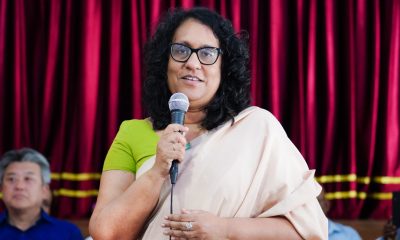
 News7 days ago
News7 days agoPrime Minister Attends the 40th Anniversary of the Sri Lanka Nippon Educational and Cultural Centre
-

 Opinion3 days ago
Opinion3 days agoJamming and re-setting the world: What is the role of Donald Trump?
-
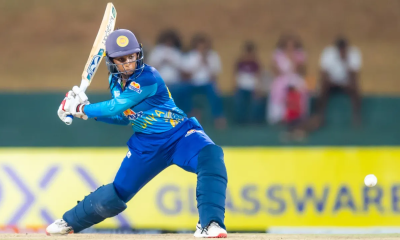
 Sports7 days ago
Sports7 days agoDottin out obstructing the field as Sri Lanka clinch series
-

 Features3 days ago
Features3 days agoAn innocent bystander or a passive onlooker?
-

 Features5 days ago
Features5 days agoBuilding on Sand: The Indian market trap
-

 Opinion5 days ago
Opinion5 days agoFuture must be won
-

 Business4 days ago
Business4 days agoIRCSL transforms Sri Lanka’s insurance industry with first-ever Centralized Insurance Data Repository
-

 Features4 days ago
Features4 days agoRatmalana Airport: The Truth, The Whole Truth, And Nothing But The Truth




